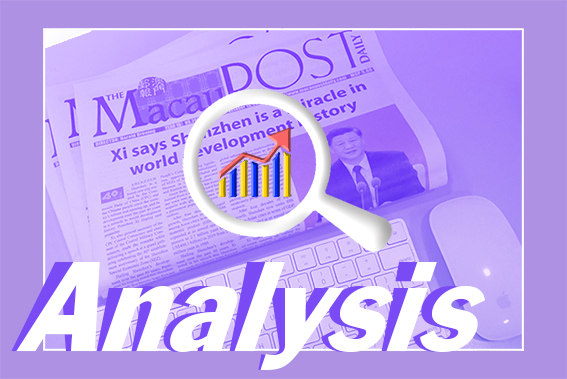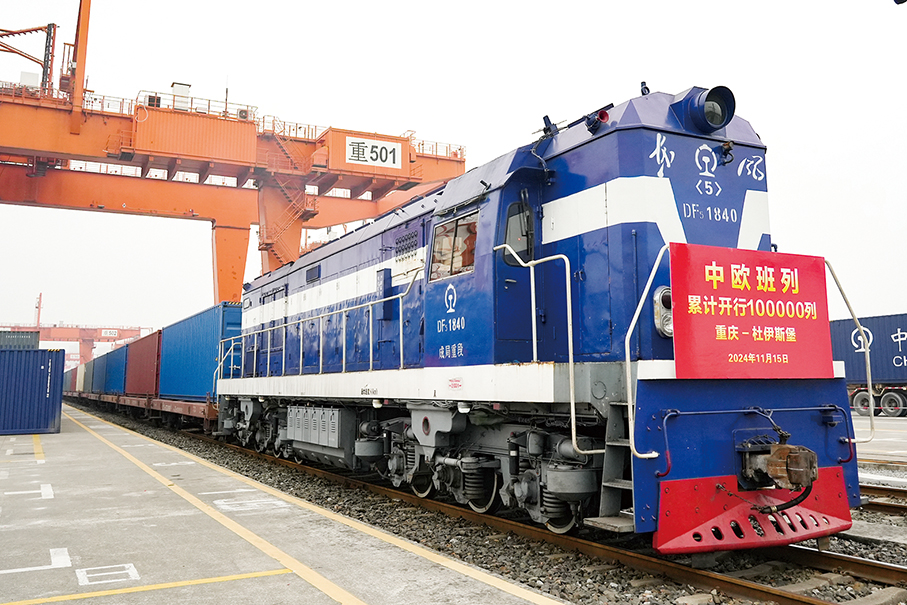Editorial
When preparing this editorial about this week’s Summit for Democracy in the US, I remembered an article that I read a few years ago about the El Paso Walmart mass shooting in 2019 in which a racist killed 20 people because he wanted to stop a “Hispanic invasion of Texas”.
Trying to make sense of such an extreme mentality, the Psychology Today author, Arash Emamzadeh, wrote that one way was “to consider it as a form of us-versus-them thinking – oversimplifying and distorting complex problems by dividing the world into an us and a them, and scapegoating and vilifying the latter.”
No doubt, “us-versus-them” is one of the most primitive – and dangerous – ways of political thinking.
According to Reuters, Canadian Prime Minister Justin Trudeau said during US President Joe Biden’s visit to his northern neighbour last week that the two countries must be united against an “increasingly assertive China.”
As a journalist it is my professional duty to pay special attention to the meaning of words. The Oxford Dictionary of English defines “assertive” as “having or showing a confident and forceful personality.” Merriam-Webster, its authoritative US counterpart, defines “assertive” as “disposed to or characterized by bold or confident statements and behavior.”
Isn’t it normal that China, which was bullied by foreign countries (Japan, UK, etc.) for over a century until the late 1940s, as the world’s number-two economy and nowadays one of its major powers politically, scientifically, technologically and culturally, is “increasingly assertive” on the international stage to defend its national interest? The US and UK, for instance, have been known for their political assertiveness in international relations for ages.
The Biden administration’s three-day Summit for Democracy 2023 starts tomorrow. Its first edition was held online in 2021. Of course, there is nothing untoward about holding a democracy summit per se. It becomes, however, problematic if it pursues the perilous “us-vs-them” approach. According to the US State Department, the summit will include a conversation with Deputy US Attorney General Lisa Monaco “on defending the rule of law against hostile nation states” and “how the US Department of Justice is countering new and evolving threats to the rule of law posed by hostile nation states, from transnational repression to foreign malign influence.”
According to the State Department, UN Secretary General António Guterres will address the summit on Wednesday. I expect Guterres, a former Socialist Portuguese prime minister, UN refugee chief and president of the Socialist International, to come up with balanced remarks about the question of democracy. Guterres, who knows China better than many other Western politicians because of his involvement in the preparations for Macau’s reversion to Chinese rule in the 1990s (I attended a press conference that he gave in Macau at that time), urged EU leaders during a visit to Brussels last week not to isolate China, pointing out that Beijing is willing to engage with the EU.
The upcoming summit in the US capital is, no surprise here, entirely focused on Western-style democracy, also widely referred to a “liberal democracy”, based on Western nations’ long-running attempt to globalise (neo-) liberalism and ensure that, ultimately, global development and modernisation result in our planet’s westernisation.
Liberal democracy is an indirect and representative form of democracy that is focused on regular elections and majority – or plurality – rule.
Democracy (from the Greek “demos” for “people” and “kratos” for “rule”) takes, quite naturally, a wide range of forms, based on the world’s over 190 nations’ different cultural, economic, political and social backgrounds and histories.
The Chinese word for democracy is “minzhu” (民主;“min” meaning “people”, “zhu” meaning “master” or “host”), a term that appeared in the mid-19th century. *
Democracy isn’t a status but a process. For instance, it was only in 1965 when the Voting Rights Act by US President B. Johnson (I admire him for that) formally undertook to overcome legal barriers that prevented African Americans from exercising their constitutionally guaranteed right to vote. Until 1952 immigrants of Asian descent were barred from becoming US citizens, and consequently, having access to the ballot box. It sounds unreal, but the Principality of Liechtenstein in central Europe granted women the right to vote only in 1984 (this is not a typing error).
As every political science student knows, there are a raft of different models of democracy in the world.
Apart from the West’s “liberal democracy” concept, there are also “socialist democracies” and other democratic systems (Singapore springs to mind) that are based on Asian values and, therefore, place great emphasis on community, social cohesion, filial piety, benevolence, and consensus politics. Aside from Confucianism, Taoism and Buddhism in East Asia, Marxism continues to shape the concept of people’s democracies not only in China but also, for instance, in Vietnam and Laos.
Several countries with rather different political systems have chosen to add the word “democratic” to their official names, such as the Democratic Republic of East Timor, Democratic Republic of the Congo, and People’s Democratic Republic of Algeria.
Biden has described the current state of world politics as an “inflection point”, i.e., a moment when people needed to choose between “democratic” and “authoritarian” systems of governance.
President Xi Jinping told Biden in Bali on the sidelines of the G20 summit last November, according to newswire reports at that time, that the “democracy versus autocracy” narrative is not the defining feature of today’s world, “and still less does it represent the trend of the times.”
According to Xinhua, Foreign Minister Qin Gang elaborated on the matter when he told reporters last week that the principal contradiction in today’s world is not at all a so-called “democracy vs autocracy” situation “played up by a handful of countries, but a struggle between development and containment of development, and between global justice and power politics”, based on “rising unilateralism and hegemonism.”
While the West, such as Washington or Brussels, will certainly deny that they are out to contain China’s development and modernisation drive, in politics – geopolitics in particular – perception is (quasi-)reality. Western politicians ought to take this into account and accept, once and for all, that China’s political system is different to theirs and that it would be absolutely foolhardy to attempt regime change in Beijing. They tried it in Hong Kong, where they utterly failed. They should also accept the fact that solving the Taiwan question is China’s internal matter. Taiwan is not Ukraine. Period! Former Taiwan leader Ma Ying-jeou will arrive for an almost two-week visit to the Chinese mainland today – a propitious sign for the positive evolution of cross-Strait ties.
Under Xi’s leadership, the Communist Party of China (CPC) has gradually been developing its concept of whole-process people’s democracy since 2019.
The Foreign Ministry has described whole-process people’s democracy as “integrating process-orientated democracy with results-orientated democracy, procedural democracy with substantive democracy, direct democracy with indirect democracy, and people’s democracy with the will of the state.”
Obviously, whole-process people’s democracy is different to the West’s election-focused “liberal democracy.” I am sure that our planet housing eight billion people on seven continents is large enough to accommodate different systems of democracy. What is most needed to ensure world peace is mutual respect for each country’s national development and security interests, non-interference in internal affairs, and cooperative competition.
President Xi attended earlier this month the “CPC in Dialogue with World Political Parties High-Level Meeting” in Beijing where he mooted China’s new Global Civilisation Initiative (GCI) which calls for respect for diversity of the world’s civilisations (with more than four millennia of recorded history, China has the world’s oldest continuous civilisation), advocates humanity’s common values, underlines different civilisations’ heritage and innovation, and calls for international people-to-people exchanges and cooperation.
The GCI is the third global initiative proposed by Xi recently, after the Global Development Initiative (GDI) and the Global Security Initiative (GSI).
“The International Forum on Democracy: The Shared Human Values”, held both online and offline in Beijing last week, the second of its kind, concluded that democracy is a common value of all mankind, and that there are many forms to realise democracy. It also urged the international community to “respect other countries’ paths in developing democracy… and promote the building of a community with a shared future of mankind.”
Democracy is a work in progress, in China, in the US, in the world’s South, wherever. While some of the world’s democratic systems are more orientated towards the interests of the community as a whole (such as in China), others are more focused on the individual and his or her rights. Different types of democracy should respect each other, based on their different cultural backgrounds and socio-political systems. For instance, Confucianism can be expected to remain a key strand of Chinese thought, alongside Marxism. Neoliberalism will probably continue to dominate the political system in the US, irrespective of whether a Democrat or Republican occupies the White House. Personally, I hope that social-democratic policies will make a comeback in Europe before long.
We should all accept the fact that democracy is a multifaceted phenomenon. Western-style democracy is not a cure-all, far from it.
Chinese-born Eurasian surgeon and author Han Suyin (1916-2012), who knew China well, would probably have described democracy in its broadest meaning as “A many splendoured thing”.
But a thing that needs special care.
– Harald Brüning
* Wei Lin: The Translated and Transformed Concept of Min Zhu (Democracy and Republic): A Political Cultural Influence on Translation. In International Journal of Languages, Literature and Linguistics, Vol.4, No.4, December 2018








